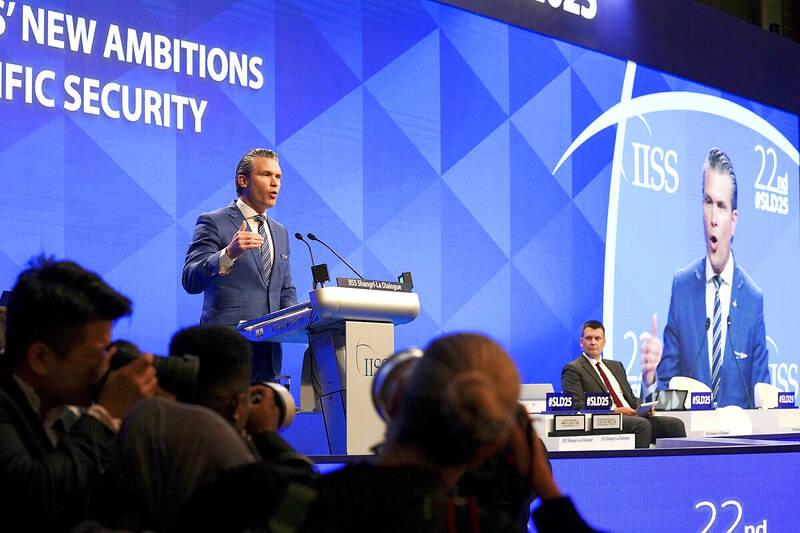US Secretary of Defense Pete Hegseth’s call for allies in the Indo-Pacific region to bolster deterrence against China signals that Taiwan is at the core of the US’ strategy in the region, a Taiwanese defense expert said.
At the Shangri-La Dialogue in Singapore on Saturday, Hegseth said that Chinese aggression toward Taiwan could be imminent and urged US allies in the region to raise defense spending to help build a “shield of deterrence.”
Reached for comment, Su Tzu-yun (蘇紫雲), a research fellow at the Institute for National Defense and Security Research, said it is important that Taiwan not only increases its defense spending, but also adjusts its strategy.

Photo: Bloomberg
Increasing military spending is not about pleasing other countries, but about fulfilling Taiwan’s own responsibility for national defense, he added.
President William Lai’s (賴清德) and Minister of National Defense Wellington Koo’s (顧立雄) respective proposals to increase defense spending to 3 percent of GDP and achieve “high combat readiness” by 2027 demonstrate Taiwan’s commitment to self-defense, which is an essential condition for gaining support from allies, Su said.
The US already called on its Indo-Pacific allies to increase defense spending during US President Donald Trump’s first administration, he said.
In Trump’s second administration, Taiwan has been explicitly included in this strategic framework, which shows Washington views Taiwan as a key ally, he added.
It also reveals the US’ logic that allies benefiting from trade surpluses with it should reasonably share responsibility for security and defense, he said.
Su said Taiwan should deepen its cooperation with allies on three key levels.
The first is strategic, as an increasing number of countries view security in the Taiwan Strait as a core issue — reflecting a global shift in strategic focus toward the region, he said.
The second concerns mutual interests, given that 51 percent of global maritime trade passes through the Taiwan Strait, underscoring that regional security directly affects the global supply chain, he added.
Third, on the military level, Taiwan should continue expanding intelligence sharing and joint military exercises with its allies, he said.
In addition, Su said the British Royal Navy’s deployment of the HMS Prince of Wales to the Indo-Pacific region in April and French President Emmanuel Macron’s keynote address at the Shangri-La Dialogue on Friday warning that failing to respond to Russia’s aggression in Ukraine could embolden China regarding Taiwan show that European nations increasingly recognize Taiwan’s strategic importance and the growing threat posed by China.
Taiwan should clarify its strategy by not only emphasizing democracy and freedom, but also focusing on mutual coexistence and shared benefits, Su said.
Taiwan should also work with allies to develop a shared vision of security, which would lay the foundation for deeper cooperation and make subsequent forms of military collaboration a matter of technical implementation, he said.

Costa Rica sent a group of intelligence officials to Taiwan for a short-term training program, the first time the Central American country has done so since the countries ended official diplomatic relations in 2007, a Costa Rican media outlet reported last week. Five officials from the Costa Rican Directorate of Intelligence and Security last month spent 23 days in Taipei undergoing a series of training sessions focused on national security, La Nacion reported on Friday, quoting unnamed sources. The Costa Rican government has not confirmed the report. The Chinese embassy in Costa Rica protested the news, saying in a statement issued the same

Taiwan’s Liu Ming-i, right, who also goes by the name Ray Liu, poses with a Chinese Taipei flag after winning the gold medal in the men’s physique 170cm competition at the International Fitness and Bodybuilding Federation Asian Championship in Ajman, United Arab Emirates, yesterday.

A year-long renovation of Taipei’s Bangka Park (艋舺公園) began yesterday, as city workers fenced off the site and cleared out belongings left by homeless residents who had been living there. Despite protests from displaced residents, a city official defended the government’s relocation efforts, saying transitional housing has been offered. The renovation of the park in Taipei’s Wanhua District (萬華), near Longshan Temple (龍山寺), began at 9am yesterday, as about 20 homeless people packed their belongings and left after being asked to move by city personnel. Among them was a 90-year-old woman surnamed Wang (王), who last week said that she had no plans

TO BE APPEALED: The environment ministry said coal reduction goals had to be reached within two months, which was against the principle of legitimate expectation The Taipei High Administrative Court on Thursday ruled in favor of the Taichung Environmental Protection Bureau in its administrative litigation against the Ministry of Environment for the rescission of a NT$18 million fine (US$609,570) imposed by the bureau on the Taichung Power Plant in 2019 for alleged excess coal power generation. The bureau in November 2019 revised what it said was a “slip of the pen” in the text of the operating permit granted to the plant — which is run by Taiwan Power Co (Taipower) — in October 2017. The permit originally read: “reduce coal use by 40 percent from Jan.